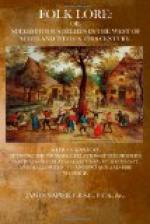We regret to say such beliefs and such means of repressing free enquiry were not confined to one branch of the Christian Church. Protestants as well as Roman Catholics, when they had the power, suppressed many of the practices of heathenism after a cruel fashion, but at the same time fostered the superstitions and Pagan beliefs which had originated these practices, and punished those who protested against these beliefs. The same method of procedure is in operation at the present day. Nevertheless, the introduction of Christianity into the heathen world made a wonderful revolution in their religious practices as well as in their beliefs. Their idols and the symbols of their divinities were abolished, along with the sacrifices offered to these. Their great festivals, at which human sacrifices were offered and abominable practices committed, were so modified as to be stripped of their immorality and cruelty, and while being retained—retained because they could not be utterly abolished—they were Christianized,—that is, a Christian colouring was given to them,—and they became Church festivals or holydays,—a subject I will treat more fully of in another chapter.
It is not, as I have already said, my intention to trace the gradual development of our modern idea of Providence, our ascription of universal government, of all direction of the phenomena of nature and of life to the one only omnipotent, omniscient, and omnipresent God, but rather to place before the reader the practices and beliefs which prevailed in this country during the early years of the present century. And from this survey we shall discover what a mass of old Pagan ideas still survived and influenced the minds and practice of the people,—how they yet clung to the notion that many of the phenomena of nature and life were under the control of supernatural agents, although they did not regard these agents, as what in olden times they were considered to be—divinities, but believed them to be a class of beings living upon or within the earth, and endowed by the devil with supernatural powers.




